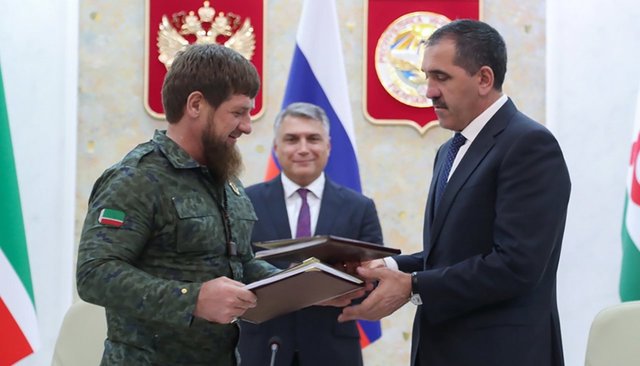On 26 September 2018 in the Russian city of Magas, an agreement was signed on the division of the border between the two regions of the Russian Federation – Chechnya and Ingushetia. After that, a powerful conflict between the two peoples broke out in the region. (Meduza)
Comment:
To understand the essence of this event, it is important to point out the prescription of this land dispute between the two fraternal peoples. It is not accidental. During the Soviet era, this Islamic land was divided with the seeds of nationalism. This is how Chechen-Ingushetia, Kabardino-Balkaria, Karachay-Cherkessia appeared. And when the Soviet Union collapsed from the Chechen-Ingush Republic, two regions appeared: Chechnya and Ingushetia. Although this is actually one people who speak the same language, their difference is that they are different sons of the same mother.
During 10 years, two wars against Russia passed in Chechnya. Ingushetia was naturally also drawn into this war, since these are fraternal peoples and neighboring houses. Russia managed to defeat this small-numbered people only at the second attempt, and only at the cost of great blood. And because until recently, the main issue in the region was the recovery from those wars. The people tried to forget that horror, and the authorities tried to show their best, creating an image of well-being.
Therefore, for a long time, the uncertainty of the borders between the regions practically did not bother anyone. After all, the owners of these lands have been known for centuries; everyone knows what kind of land belongs to this or that clan.
But at the beginning of August 2018 in the Caucasus the thunder, which shook the walls of the Kremlin, rumbled. Yusup Temerkhanov, who was serving a sentence for the murder of Russian colonel Budanov, died in prison. In 2000, this Russian colonel raped, murdered and abused the body of a Chechen girl Elsa Kungaeva. Therefore, Yusup Temerkhanov was a hero among his people. And when he died in prison, having undergone tortures and harsh conditions of imprisonment, all the peoples of the Caucasus gathered on August 5 in the capital of Chechnya, Grozny, in order to conduct the person who represented retribution to the Russian troops in the last way.
And the authorities were seriously frightened when they saw 200 thousand Muslims of different nationalities from the Caucasus regions, together giving Takbir to Allah. This fear of the invasion of Islam on 27 September was voiced by General Matovnikov, a Russian President’s Plenipotentiary Representative in the Caucasus. He said: “We are witnessing a marked increase in the number of people who came to Islam from other religions.”
Bachurin, a head of the Central Caucasus Directorate of Internal Affairs, said: “New believers become the most motivated and fanatical supporters of extremist and terrorist ideologies. In the first half of 2018 alone, 1,058 neophytes were established. This is a large part of citizens, and they should not be indifferent to us”.
Hence, it becomes clear that it is the authorities that resort to dirty methods of pitting peoples against each other in a multinational region in order to keep the people from thinking about the most important issues. These issues are the revival of the Islamic way of life and the position of Russian power over Muslims. The rulers tried to prevent such a dramatic warming of relations between the peoples of the region and their desire for Islam, and started their machinations.
So they initiated this controversial land agreement. And the situation began to heat up in the region. The head of the district, whose part of the land became part of Chechnya, resigned. Together with him, several deputies of the local assembly resigned. There have been arrests and searches of active opponents of this agreement. And all this is happening against the background of the fact that the text of the agreement has not yet been published. That is, the government deliberately keeps people in ignorance, pushing them to distrust and enmity. Social networks are boiling against national attacks. And many already fear bloodshed.
In addition to this land dispute, there was another very big conflict between the Ingush and the Chechens in the Caucasus. On 19 September, mass clashes took place in Kabardino-Balkaria, where hundreds of people participated in the inter-ethnic fights. The cause of this conflict was the equestrian march on the occasion of the celebration of the victory over the troops of the Ottoman Caliphate in 1708. The same fraternal peoples of the Muslims – Kabardians and Balkars clashed in this provocation, supported by the authorities. To pacify this unrest came the police of other nationalities from the neighboring republics, the Ossetians and the Ingush.
Tenov, a professor of sociology at the Kabardino-Balkarian University, commented on these events: “5-6 years ago, the development of Islam was observed in our region. And it was obvious how the authorities oppose this to the ethnic factor … ” (Gazeta Vzlyad, September 20, 2018).
This is only the most known of what the authorities are doing to set peoples of the Caucasus on each other. In their fear of spreading Islam, they resort to baseness, which is nationalism. They want bloodshed to judge these conflicts. They want to force Muslims to seek a solution addressing only to them.
But Islam never comes into the hearts of people so that it does not reflect in their behavior. We see that the Islamic appeal sounds stronger. In all the controversial disputes around these conflicts, there is always someone who points to the prohibition of nationalism. People are increasingly pointing to the true sources of these misfortunes and understand that the enemy wants disunity.
إِنَّ اللَّهَ لاَ يُغَيِّرُ مَا بِقَوْمٍ حَتَّى يُغَيِّرُوا مَا بِأَنفُسِهِمْ
“Indeed, Allah will not change the condition of a people until they change what is in themselves”.
Ibragim Suleymanov

